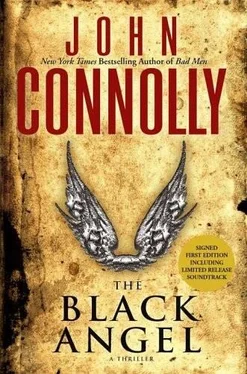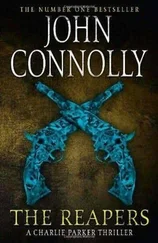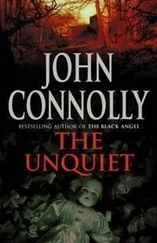The raiders descended into the garden, then separated. Two moved toward the house, the others to the gate, but at a prearranged signal all stopped and surveyed the dwelling. Seconds ticked by, but still they did not move. They were four black sentinels, like the burned remains of dead trees enviously regarding the slow coming of spring.
Inside the house, Murnos sat before a bank of TV monitors. He was reading a book, and the figures surrounding the property might have been interested to see that it was a concordance to Enoch. Its contents fueled the beliefs of those who threatened his employer, and Murnos felt compelled to learn more about them in order to understand his enemy.
“They shall be called upon earth evil spirits, and on earth shall be their habitation.”
Murnos had grown increasingly uneasy with Stuckler’s grand obsession, and recent events had done nothing to assuage his concerns. The purchase of the latest fragment at auction was a mistake: it would draw attention to what was already in Stuckler’s possession, and Murnos did not share his employer’s belief that an agreement could be reached with those others who were also seeking the silver statue.
“Evil spirits shall they be upon earth, and the spirits of the wicked shall they be called.”
Beside him, a second man watched the screens, his gaze flicking carefully across each one. There was a single window in the room, overlooking the garden. Murnos had warned Stuckler about it in the past. In Murnos’s opinion, the room was unsuited to its primary purpose. He believed that a security room should be virtually impregnable, capable of being used as a panic room if necessary, but Stuckler was a man of many contradictions. He wanted men around him, and he desired the impression of security, but Murnos did not think that Stuckler really considered himself to be at risk. He was his mother’s creature in every way, the knowledge of his father’s strength and the nature of his sacrifice instilled in him from an early age, so that it verged on the sacrilegious for him to indulge in fear, or doubt, or even concern for others. Murnos hated the old woman’s occasional visits. Stuckler would send a limousine for her, and she would arrive with her private nurse, wrapped in blankets even in the height of summer, her eyes shaded by sunglasses all year round, an old crone who persisted in living while taking no joy in any aspect of the world around her, not even in her son, for Murnos could see her contempt for Stuckler, could hear it in her every utterance as she looked upon this prissy little man, softened by indulgence, his weaknesses redeemed only by his willingness to please her and his hero worship of a dead father so intense that occasionally the hatred and envy that underpinned it would bubble through, contorting him with rage and transforming him utterly.
“No food shall they eat, and they shall be thirsty; they shall be concealed, and shall rise up against the sons of men…”
He looked at Burke, his coworker. Burke was good. Stuckler had initially balked at paying him what he asked, but Murnos had insisted that Burke was worth it. The others, too, had all been approved by Murnos, even if they were not quite in Burke’s league.
And still Murnos believed that they were not enough.
A light began to flicker rhythmically on a panel on the wall, accompanied by an insistent beeping.
“The gate!” said Burke. “Someone’s opening the gate.”
It wasn’t possible. The gate could only be opened from within, or by one of the three control devices contained in the cars, and all of the vehicles were on the property. Murnos checked the monitors and thought for an instant he saw a figure beside the gate, and another leaving a copse of trees.
“…for they come forth during the days of slaughter and destruction.”
And then the screens went dead.
Murnos was already on his feet when the window beside them was blown apart. Burke took the brunt of the first fusillade, shielding Murnos for valuable seconds and enabling him to get to the door. He scrambled through as bullets pinged off metal and pock-marked the plaster on the walls. Stuckler was upstairs in his room, but the noise had woken him from his sleep. Murnos could already hear him shouting as he entered the main hallway. Somewhere in the house, another window shattered. A small man with a gun appeared from the kitchen, barely more than a shadow in the gloom, and Murnos fired at him, forcing him back. He kept firing as he made for the stairs. There was a Gothic-style window on the landing, and Murnos saw a shape pass across it, ascending the outside wall toward the second floor. He tried to shout a warning as he heard more shots, but he stumbled on the stairs, and the words were lost in an instant of shock. Murnos gripped the banister to lift himself up, and his hands slid wetly upon the wood. There was blood on his fingers. He looked down at his shirt and saw the stain spreading across it, and with it came the pain. He raised his gun, seeking a target, and felt a second impact at his thigh. His back arched in agony, his head striking hard against the stairs and his eyes briefly squeezing shut as he tried to control the pain. When he opened them again there was a woman staring at him from above, the shape of her clearly visible beneath her dark clothing, her eyes blue and hateful. She had a gun in her hand.
Instinctively, Murnos closed his eyes again as death came.
Brightwell drove to the front of the house and entered the grounds. He followed Miss Zahn down to the cellar, through the racks of wine, and into the treasury that now lay open to him. Above him loomed the great black statue of bone. Stuckler was kneeling before it, dressed in blue silk pajamas. There was some blood in his hair, but he was otherwise unhurt.
Three pieces of vellum were handed to Brightwell, taken by his raiders from the shattered display case. He handed them over to Miss Zahn, but his gaze was fixed upon the statue. His head came almost to the level of its rib cage, the scapulae fused to the sternum at the front and to each other at the back, like an armored plate. He drew back his hand and punched hard against the mass of bone. The sternum cracked under the impact.
“No!” said Stuckler. “What are you doing?”
Brightwell struck again. Stuckler tried to stand, but Miss Zahn forced him to stay down.
“You’ll destroy it,” said Stuckler. “It’s beautiful. Stop!”
The sternum shattered under the force of Brightwell’s blows. The skin on his knuckles and the back of his hand had been torn by the sharp bone, but he did not seem to notice. Instead, he reached into the hollow that he had created and explored it, his arm buried within the statue almost to the elbow and his face tensed with the effort, until his features suddenly relaxed and he withdrew his hand. There was a small silver box clutched in his fist, this one entirely unadorned. He opened his hand and displayed the box to Stuckler, then carefully removed the lid. Inside was a single piece of vellum, perfectly preserved. He handed it to Miss Zahn to unfold.
“The numbers, the maps,” he said to Stuckler. “They were all incidental, in their way. What mattered was the bone statue, and what it contained.”
Stuckler was weeping. He reached for a shard of shattered black bone and held it in his hand.
“You did not understand your own acquisitions, Herr Stuckler,” said Brightwell. “ ‘Quantum in me est.’ The details lie in the fragments, but the truth lies here.”
He threw the empty box to Stuckler, who touched his fingers to the interior in disbelief.
“All this time,” he said. “The knowledge was within my grasp all this time.”
Brightwell took the final piece of fragment from Miss Zahn. He examined the drawing upon it and the writing above. The drawing was architectural in nature, showing a church and what appeared to be a network of tunnels beneath it. His brow furrowed, then he began to laugh.
Читать дальше












